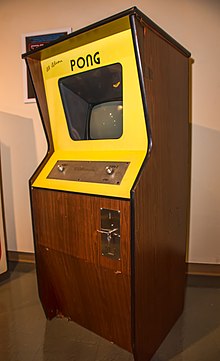
Back بونغ (ألعاب فيديو) Arabic بونج ARZ Pong AST Pong Azerbaijani Pong BAR Pong Byelorussian Pong (гульня) BE-X-OLD PONG Catalan Pong Czech Pong Welsh
| Pong | |
|---|---|
 An upright cabinet of Pong on display at the Neville Public Museum of Brown County | |
| Developer(s) | Atari |
| Publisher(s) | Atari |
| Designer(s) | Allan Alcorn |
| Platform(s) | Arcade Dedicated console |
| Release | |
| Genre(s) | Sports |
| Mode(s) | Single-player, multiplayer |
Pong is a 1972 sports video game developed and published by Atari for arcades. It is one of the earliest arcade video games; it was created by Allan Alcorn as a training exercise assigned to him by Atari co-founder Nolan Bushnell, but Bushnell and Atari co-founder Ted Dabney were surprised by the quality of Alcorn's work and decided to manufacture the game. Bushnell based the game's concept on an electronic ping-pong game included in the Magnavox Odyssey, the first home video game console. In response, Magnavox later sued Atari for patent infringement.
Pong was the first commercially successful video game,[3] and it helped to establish the video game industry along with the Magnavox Odyssey. Soon after its release, several companies began producing games that closely mimicked its gameplay. Eventually, Atari's competitors released new types of video games that deviated from Pong's original format to varying degrees, and this, in turn, led Atari to encourage its staff to move beyond Pong and produce more innovative games themselves.
Atari released several sequels to Pong that built upon the original's gameplay by adding new features. During the 1975 Christmas season, Atari released a home version of Pong exclusively through Sears retail stores. The home version was also a commercial success and led to numerous clones. The game was remade on numerous home and portable platforms following its release. Considered to be one of the most culturally significant and greatest video games of all time, Pong is part of the permanent collection of the Smithsonian Institution in Washington, D.C.
- ^ Cite error: The named reference
Akagiwas invoked but never defined (see the help page). - ^ "After Pong". ACE. No. 6 (March 1988). February 4, 1988. pp. 29–32 (31).
- ^ "Atari PONG". The Centre for Computing History. Retrieved February 17, 2024.